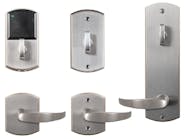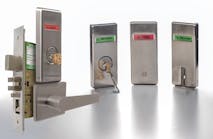AN ARGUMENT AGAINST VAN SIGNS
Many locksmiths have some form of signage on their service vehicles. It has been an excellent way to attract attention and gain new business. Unfortunately signs can also attract unwanted attention. Driving an unmarked service vehicle does not attract much attention. Driving a service vehicle with company signs tells some people that you have insurance, making you a prime target for an “accident.”
Several locksmiths have told me that they have removed the signs from their vehicles either following an “accident” or a close call. What do you think?
KEYMARK X4 by MEDECO
The patent protection for the KeyMark is ending in 2011. To that end Medeco has introduced the KeyMark X4. The KeyMark X4 by Medeco is patent protected until 2027. KeyMark X4 lock cylinders are available as SFIC, LFIC, mortise, rim and key-in-lever/knob.
Like KeyMark, KeyMark X4 utilizes the standard A2 pinning system. However, KeyMark X4 also incorporates a betted slider locking arrangement that allows for four times the number of change keys. This expands a seven-pin master key system (16,384 theoretical changes) up to 65,536 theoretical changes on a single keyway.
Unlike the KeyMark, the KeyMark X4 key blanks can be originated using standard code type key machines including the A1 Green Machine, HPC 1200 with the B clamp and CW-90MC cutter and the Best, Falcon & Arrow code card, ITL 9000 and Pro-Lok Blue Punch.
MORE INVOICE PROBLEMS
The 2010 Kia Rio has a sidewinder lock mechanism using the code series “K0001-K2500”. A locksmith called with 2010 Rio. The key code on the Kia Rio invoice was V2406. The “V0001-V1200” code series was last used on the 2009 Rio, which was equipped with an eight cut wafer lock.
Because the 2010 Rio uses a sidewinder lock mechanism, the “V” code series is not correct. Instead use the Kia “K0001-K2500” code series changing the “V” to a “K”. A key was originated to the K2406 code. It operated the vehicle.
NEW JET AUTOMOTIVE KEY BLANKS
Jet Hardware has introduced 11 automotive key blanks. Two of the key blanks are available with or without transponder chip. In addition, Jet has introduced four non-transponder key blanks. Two of these key blanks can be used as “test” keys for determining the bittings.
These new key blanks are:
Jet Hardware Bianchi Ilco JMA Transponder Vehicles Notes
HU69-PHT n/a n/a TP25HU-HAA.P Yes Audi
HU69-PHT-LC* n/a n/a TP00HU-HAA.P Chipless Audi Less Chip
S30FD-PH FD3P S30FD-P FO-6.P No Ford/Jaguar Tibbe
KK7-PHT BK14TK13 KK7-PT TP19KI-7.P Yes Kia
KK8-NP n/a n/a n/a No Kia
KK8-PH n/a KK8-P n/a No Kia
KK9-PHT n/a KK9-PT TP12TOYO-18.P Yes Kia
KK9-PHT- LC* n/a n/a TP00TOYO-18.P Chipless Kia Less Chip
LXP90H-PH BLX90-P LXP90-P LXP90-PH No Lexus/Mazda/
Hyundai/Kia
TR51-PHT BTOY44D-PT TOY44D-PT TP30TOYO-15.P Yes Toyota
HU68-PHT n/a HU66T24 TP23HU-HAA.P1 Yes Volkswagen
For more information, contact your local locksmith distributor or Jet Hardware Manufacturing Corp., 800 Hinsdale St., Brooklyn, NY 11207. Telephone: 718-257-9600. Fax: 718-257-0973. Website: www.jetkeys.com.
TOYOTA TOOL
A specialized tool is being marketed to program Toyota vehicles operating with the “4D” transponder chip. It appears that this tool can program the vehicles; however, there are strong warnings on the web sites including “you take the consequences.”
MAJOR MFG. HIT-145 DRILL GUIDE
Major Manufacturing has introduced the HIT-145 Drill Guide for installing the Schlage AD Series Cylindrical Locks. The three-sided HIT-145 Drill Guide is mounted onto the using the existing 2-1/8” crossbore for alignment. The drill guide has hardened steel bushings on both sides to enable drilling from either side of the door. The HIT-145 drill guide will center on a standard 1-3/4” door. It will accommodate doors up to 2” thick with a 2-3/4” backset.
For more information, contact your local locksmith distributor or Major Manufacturing, 1825 Via Burton, Anaheim, CA 92806. Telephone: 714-772-5202. Web Site: www.majormfg.com.
SECURITY SAFE LIGHT
This battery-operated LED light is configured to mount onto the door of a safe and illuminate the dial or keypad. The Security Safe Light has a two-minute lighting cycle that illuminates a red LED lighting source. The red LED does not affect a person’s night vision, so he or she can still see in the dark in case of an emergency.
This light has a contoured bottom to mount onto the safe door just over the dial or keypad. It is equipped with a magnet for attachment onto the safe door. There are two version of the Security Safe Light; one is for mechanical dial safe lock and the second is for electronic keypad safe locks. The included 3 volt lithium battery has an operating life expectancy of at least 750 operations.
For more information, contact your local locksmith distributor.
LOCKCRAFT KEY BLANKS
A1 Security has partnered with Lockcraft (LC) in order to promote the LC key blank brand. The LC automotive key blanks include VATS key blanks; transponder equipped key blanks, and plastic and metal head key blanks. Most key blanks are available with or without manufacturers logo. All key blanks are individually bagged in a LockCraft poly bag with LC, the Original Equipment and an industry part number. All non-electronic metal & plastic head key blanks will ship ten per box.
For more information, contact your local locksmith distributor or A1 Security Mfg., Telephone 877-725-2121.
SCHLAGE ACQUIRES DOOR HARDWARE DIVISION
Schlage Lock Company LLC, a business unit of Ingersoll Rand, has acquired the assets of the Door Hardware Division of Fusion Hardware Group. Fusion™, is a designer and manufacturer of decorative door hardware and accessories including handle sets, knobs, levers, deadbolts, and accessories.
TOYOTA “G” CHIP TRANSPONDER
The Toyota “G” key blank uses a Texas Instruments 80 bit transponder. The basic 80 bit transponder is the same as the Ford 80 bit transponder that is being used on the 2011 F-Series heavy Duty pickups and the 2011 Mustangs. Even though they are the same, each is made unique by the Ford and Toyota programming.
The “G” stamped into the blade just beneath the plastic head identifies original equipment Toyota “G” keys. The photo is from a 2010 Toyota Venza. There should not be a problem programming these keys. However, it is probably a good idea to check your instruction manual. It appears that at this time, cloning is not an available option.
CAR-OPENING TECHNIQUES: 1994-2002 Land Rover / Range Rover
This month we will offer recommended car-opening techniques for the 1994-2002 Land Rover / Range Rover. These large sport utility vehicles are equipped with inside vertical lock control linkage rods inside the doors that are unprotected. These years of Range Rovers are not equipped with the deadlocking mechanism.
Important: Be extremely careful when inserting, manipulating or removing the car opening tool from the door cavity. If the tool becomes wedged against the window, it can break the glass.
The following opening methods can be used to unlock the 1994-2002 Land Rover / Range Rover.
Use the High Tech Tools ‘S’ Tool #47 and a wedge to unlock the passenger door locking mechanism. Insert the wedge between the weather stripping and the glass along the front edge of the outside door handle assembly. Insert the ‘S’ Tool #47 into the door cavity with the tip pointing rearward in forward of the wedge. Lower the tool into the door manipulating it towards the rear until the tip contacts the vertical linkage rod. When contacted the locking button will move. Capture the vertical locking rod. Twist the #47 car opening tool to bind and lift the tool to unlock the door locking mechanism.
Use the HPC CO-76 opening tool, a wedge and an inspection light to unlock the front passenger door locking mechanism. Begin by inserting the wedge just forward of the vertical locking button of the front passenger door. Insert the inspection light to determine the location of the lazy pawl. Insert the CO-76 car-opening tool into the door cavity. Push the handles together to extend the hook end from the tube. With the tip of the tool in line with the vertical linkage rod, grasp the rod and pull the handles apart to secure the rod. Carefully lift the tool to unlock the door locking mechanism.
Use the Pro-Lok AO-01 Slide Lock Tool, an inspection light and an inflatable wedge to unlock the rear passenger door locking mechanism. Begin by inserting the inflatable wedge seven inches from the front edge of the rear passenger door window. Inflate the wedge according to manufacturer’s instructions. Insert the inspection light and identify the vertical rod directly beneath the locking button. Insert the U-end of the AO-01 Slide Lock Tool into the door one inch from the front edge of the window with the tip facing rearward. Lower the tool nine inches into the door cavity. Rotate the tool 90 degrees clockwise. Lift the AO-01 tool until the tip is directly under the base of the vertical locking button. Lift the tool to unlock the locking mechanism. Deflate the wedge.
Use the Slide Lock Serpent Tool™ and a wedge to unlock the rear passenger door locking mechanism. Insert the wedge behind the locking button far enough to accommodate the Serpent Tool. Carefully insert the car opening tool into the door cavity with the tip pointing forward. Lower the tool until the tip is beneath the locking button. Manipulate the tip of the tool until it contacts the vertical locking rod and the bottom of the locking button. Carefully raise the tool to unlock the locking mechanism.
Use the Tech-Train Productions TT-1017 car-opening tool and a wedge to unlock the passenger door locking mechanism. Begin by inserting a wedge near the inside lock control button in the passenger door. An inspection light can be used to view the vertical linkage rod. Carefully insert the TT-1017 car opening tool into the opening so the hooked end of the tool can grasp the linkage rod from the outboard side of the door. Make certain the hooked end of the tool is no longer against the glass before rotating. Rotate the tool to capture the vertical linkage rod. Watch the locking button for movement when rotating the car opening tool. Once there is movement, pull the car opening tool towards the front of the vehicle to bind the vertical linkage rod. While maintaining binding pressure, lift the tool to unlock the door locking mechanism.
The direction to rotate the 1994-2002 Land Rover Range Rover driver’s door lock plug to the unlocked position is counterclockwise. There is no key lock on the front passenger door.
For more information, contact your local locksmith distributor or the following car-opening tool manufacturers:
High Tech Tools, 628 NW 28th St., Miami, FL 33142. Telephone: 800-323-8324. Fax: 305-635-1015. Website: www.hightechtools.com.
HPC Inc., 3999 N. 25th, Schiller Park, IL 60176. Telephone: 847-671-6280. Fax: 847-671-6343. Website: www.hpcworld.com.
Pro-Lok, 655 North Hariton St., Orange, CA 92868. Telephone: 714-633-0681. Fax: 714-633-0470. Website: www.pro-lok.com.
Slide Lock Tool Co. Inc., 1166 Topside Rd., Louisville, TN 37777. Telephone: 800-336-8812. Website: www.z-tool.com.
Steck Manufacturing Company, 1115 S. Broadway, Dayton, OH 45408. Telephone: 800-227-8325. Web Site: www.steckmfg.com.
Lockmasters Inc., 2101 John C. Watts Drive, Nicholasville, KY 40356. Telephone: 800-654-0637. Fax: 859-885-7093. Website: www.lockmasters.com.
We are interested in printing opening methods from other car-opening tool manufacturers. To have your instructions published, contact technical editor Jerry Levine, phone 818-700-0640, e-mail jilevine@sbcglobal.net.





